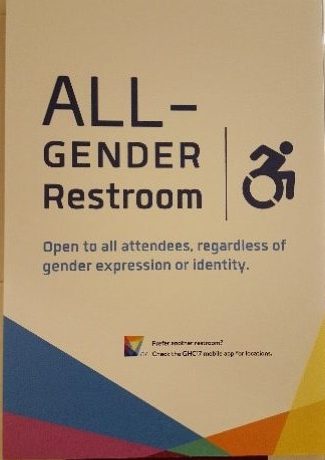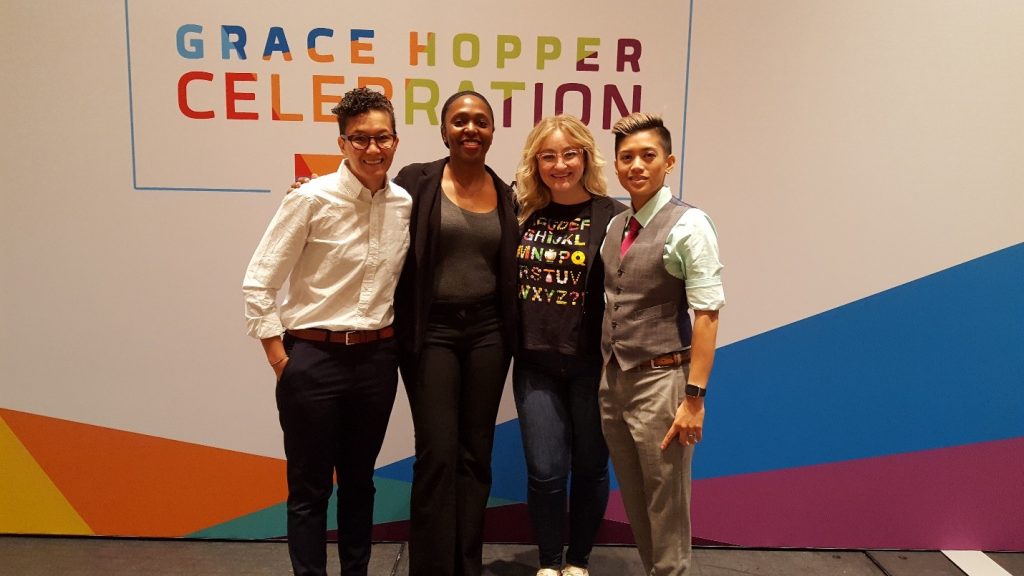Intersectionality And Grace Hopper Celebration
It’s no secret that women are the minority in the technical world, but a closer look at diversity statistics reveals shockingly smaller numbers representing queer, black, disabled, and trans people, among a litany of others. This year, The Grace Hopper Celebration of Women in Computing (GHC) perpetuated the idea that now, more than ever, we need to focus on breaking down intersectionality within the tech world.
Intersectionality describes the interconnected nature of social categorizations such as race, class, and gender as they apply to a given individual or group, regarded as creating overlapping and interdependent systems of discrimination or disadvantage. The term, intersectionality, was coined by American feminist, legal scholar and civil rights advocate, Kimberlé Crenshaw. This year, GHC recognized intersectionality as a challenge and took steps to mitigate its effects.
GHC is one of the most successful and inspiring conferences that celebrates diversity in the technical world. This year, 18,000 participants gathered to celebrate and encourage women in computing who, through years of work and collaboration have not only made significant contributions to the tech world, but who also inspired and lifted up other women along the way. Those numbers include students, university and company representatives, and prominent women (and men) in the technological world.
How Did Intersectionality Become A Problem?
For many institutions, diversity recruiting practices involves recruiting cisgender (cis), ethnic majority women into technology. Tiffany Price, a diversity panelist at GHC, describes these practices as low-hanging fruit. She proposes the idea that this occurs because it is easy and because companies can then check the box for diversity without having to delve into the challenging difficulties when recruiting minorities in tech. In a world where men dominate the playing field it is easy to see how companies can believe that recruiting women is good enough. That could not be further from the truth. When we look at identities not commonly mentioned when speaking about diversity: race, ethnicity, age, orientation, ableism, and others, we see that including women is just the tip of the iceberg.
GHC Events
One of the subtler methods practiced by GHC to recognize the ever-growing Tech community was the inclusion of several All-Gender restrooms, specially marked and distributed throughout the conference center. Something so small, yet so encouraging to those who feel they have no place, is exactly the kind of small steps that universities and companies can make in their journey toward inclusion.

In addition, GHC held a multitude of socials to welcome minorities that are still underrepresented in the technical world. Socials for Asian, Black, Native American, and LatinX peoples were held throughout the conference, further perpetuating the sense of community and strong presence these groups have.
For myself, the most inspiring way GHC brought intersectionality to attention was the panel session on this topic. Panelists included Tiffany Price, a cis woman who presents herself first as Black and then as a woman, Ciara Trinidad, a racially-mixed queer woman who identifies as masculine-of-center, Dominique DeGuzman, a Filipino queer woman who also identifies as masculine-of-center, and Megan Delassio. These women came together to speak at GHC about how they have experienced the backlash of intersectionality and how the tech world can adapt to eradicate them. As a black woman in a technical field, I often empathized with their experiences and attitudes. But more important were the ideas the panel put forth on how companies can approach D&I to include minority identities. The simplest idea: create an inclusive environment at your workplace by spreading information about correct terms and pronouns. Something as simple as the way you speak to or about someone can perpetuate the idea that they are welcome. Simple ideas like this can be compounded by actually collecting data to paint a better portrait of your community as a whole. Many would be surprised to find out that more that 1% of the technological world identifies as trans. This panel opened my eyes to the fact there is still much work to be done to create an environment where minorities feel essential in the tech world.
 Panelists: Ciara Trinidad, Tiffany Price, Megan Delassio and Dom DeGuzman
Panelists: Ciara Trinidad, Tiffany Price, Megan Delassio and Dom DeGuzman
Call To Action
Celebrating and encouraging minorities in the technical world can be exhausting and difficult. With a stunning lack of resources, networks and open encouragement for minorities, your challenge, and the challenge put forth by GHC this year, is to be the change you want to see – reach out, create networking groups, and openly encourage others to do the same. If we begin to recognize these minority groups as valuable in our fields, the rest will fall into place. Just as women have inspired, built, and challenged the technological world and will continue to do so for generations, so too will those included in these minority categories.